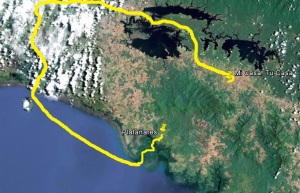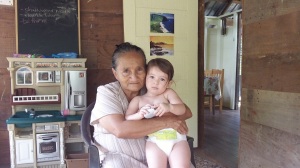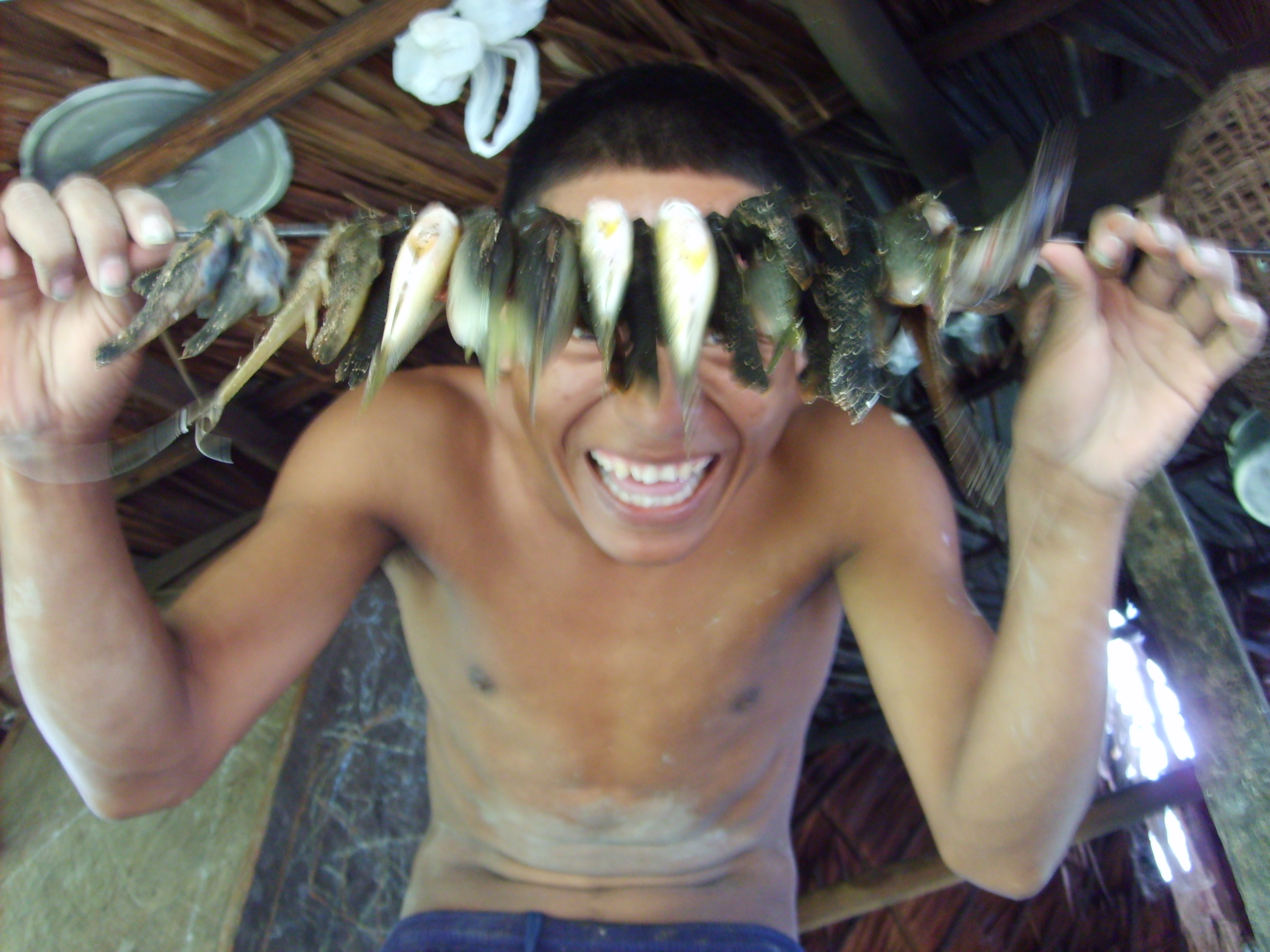Platanares is the community of the late Alquilo Opua, the chief that was killed by loggers back in the Spring, located upriver from the Pacific Coast. They had called and asked for help to fix their slow sand filter which should purify the water from the creek that serves as their water source. Although they had previously used and maintained the filter over a period 20 years, a government project came in to ¨improve¨ the system 5 years ago. The filter has not worked since.
 While Platanares is a mere 15 miles the way the crow (or toucan) flies, it takes me a 3 hour car ride and then a 5 hour boat ride to arrive. We also must travel with the tides. So for the first trip, to inspect and assess the system, I left home at 3:30 am. All went well, the prognosis simple and feasible for us to fix without outside funding, so they requested a 2nd visit to start work.
While Platanares is a mere 15 miles the way the crow (or toucan) flies, it takes me a 3 hour car ride and then a 5 hour boat ride to arrive. We also must travel with the tides. So for the first trip, to inspect and assess the system, I left home at 3:30 am. All went well, the prognosis simple and feasible for us to fix without outside funding, so they requested a 2nd visit to start work.
I met Neldo and the chief at the port and we were off. Four hours into the trip, nearing the mouth of the river, we entered the veil of rain that had been looming in the distance. I was required to sight a small ship on the starboard horizon as long as possible to try and keep the course straight so we could make it to the river´s entrance without running aground or drifting out to sea. The sun was setting as the rain let up and we found ourselves winding up the wide, lazy river. ¨Creciente,¨ said the captain as others nodded with concerned looks. That means the river is rising. I didn´t see the big deal, a few yellowing leaves and a twig or two drifting down the slick, clean water. We ascended and the wall of mangroves on each side narrowed, the water hastening its rush to the ocean, more debris, and the dark, slick water becoming a frothy chocolate. I learned that day that a 2-stroke engine, which includes nearly all of their outboard motors, does fine in filthy water, assuming one can dodge any major obstacles in the path; a four-stroke, however, gets clogged in the cooling system, overheats, and shuts down. We were in the bigger fishing boat with the 4 stroke. The 115 hp engine screamed behind the small vessel and violently churned water. The muddy waters raced down both sides of the boat, but a glance at the banks showed that we were advancing upriver at the pace of a fast walk. It was dusk. I could see that the main channel of the swollen river now carried limbs and even tree trunks. The pilot deftly cut across once, then again, as we passed two bends in the river. ¨How far to go?¨ ¨10 minutes or so,¨ was the reply as I cringed hoping they´d forgotten that I was late arriving to the port.
Beep. Beep. Beep. The overheating warning. The pilot lunged the boat away from the main channel towards the wall of tangled mangrove branches. Everyone grasped at branches with two hands, except the lady holding her baby… who grasped with one hand. The engine cut off. One youth jumped into the mangrove muck on the bank, and another tossed him a rope. ¨Don´t let go of the branches.¨ The swift current threatened to drag us into the main channel where water and tree trunks would splinter the fiberglass boat, the community´s most valuable possession and our only refuge. It was dark on the river, much more peering into the thicket of trees that tethered us to safety. Without discussion or fanfare, the young pilot, Jorge, disappeared into the forest… no flashlight, no shoes.
An old-timer chuckled about spending the night there in the boat and asked who wanted coffee. I couldn´t tell what was a joke and what wasn´t, so I affirmed that coffee would be good. He looked a little surprised as the boat´s 12 volt light came on and someone started rummaging through supplies bound for one of the community´s dry goods stores in search of coffee. Someone else pulled out the small burner that the fishermen use to prepare their meals. We could hear the waters and debris rushing by in the darkness, but the air hung thick and still, almost dripping; and the mangrove bugs started coming out.
I was now glad that I hadn´t brought along Colleen and Kalea. Actually, the main reasons they chose to stay home were a) exhaustion from the recent trip to Yaviza and b) Platanares is notorious for a tiny, blood-sucking insect that lives in the mangroves akin to what we call a no-see-um, but the tropical version is on steroids. We flailed and swatted for a half hour or so when the distinct hum of a 2-cycle outboard had us straining our eyes towards the darkness. It ripped past us and flipped around in the river channel before easing up beside us. It was Jorge. ¨Women, children, and guests first,¨ was the unspoken invitation.
We all made it back safe and work the following day was a big success… over 13 tons of rock and sand lifted out of the filter tank in buckets and sieved. Since the government project 5 years previously had made the community cut down all the shade trees around the tanks, the labor amounted to cruel and unusual punishment, but everyone worked with joy and laughter. Praise the Lord for this organized and motivated community! and check out the work in this short video.
[youtube=http://www.youtube.com/watch?v=964mDpaqgOk&feature=youtu.be&rel=0]


